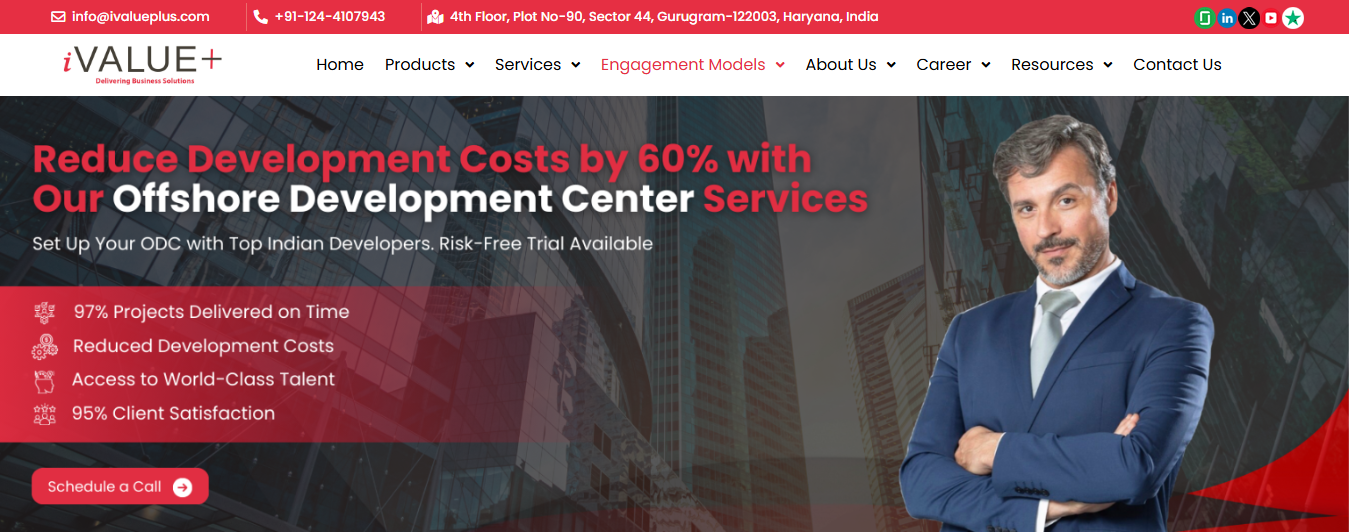Confused between GCC and ODC? Learn the key differences, benefits,...

The Future of Global Expansion: Why Companies Setup ODC in India
September 5, 2025- GCC advantages
- GCC global expansion
- GCC innovation
- GCC strategic value
- GCC vs ODC
- Global Capability Center
- iValuePlus offshore development centre.
- ODC benefits
- ODC cost savings
- ODC dedicated teams
- ODC for startups
- odc model
- ODC outsourcing India
- ODC scalability
- ODC setup partner
- ODC vs GCC comparison
- offshore development center
- Offshore development services
- offshore strategy
- setup odc in india


Choosing the Right Offshore Strategy for Global Expansion
The global business landscape has changed drastically in the last two decades. Companies of all sizes are under pressure to innovate, reduce costs, and expand internationally. To achieve these goals, many organizations turn to offshore strategies. Two of the most widely adopted models are the Global Capability Center (GCC) and the Offshore Development Center (ODC).
Although both models aim to leverage global talent and optimize operations, their structures, objectives, and implementation differ significantly. For businesses evaluating GCC vs ODC, the choice can directly impact scalability, cost-effectiveness, and long-term success.
This article explores the differences between GCC and ODC, their advantages, use cases, and how to choose the right offshore strategy for global expansion.
What is a GCC (Global Capability Center)?
A Global Capability Center (GCC), previously called a “captive center,” is an offshore unit wholly owned and operated by the parent company. GCCs act as strategic hubs for global enterprises, focusing not just on cost savings but also on innovation, business transformation, and specialized operations.
Key Characteristics of GCCs:
- Ownership: Fully owned by the parent company.
- Purpose: Long-term strategic innovation, R&D, core business functions.
- Scale: Large operations spanning IT, finance, HR, product development, and analytics.
- Typical Users: Multinational corporations (MNCs) with significant global presence.
For example, Fortune 500 companies often establish GCCs in countries like India, Poland, or the Philippines to gain access to skilled talent, ensure intellectual property (IP) protection, and maintain full operational control.
What is an ODC (Offshore Development Center)?
An Offshore Development Center (ODC) is a dedicated offshore team or unit, usually established with the support of a third-party partner. Unlike GCCs, ODCs are more flexible, cost-effective, and quicker to set up. They primarily serve functions such as software development, IT support, product engineering, and digital transformation initiatives.
Key Characteristics of ODCs:
- Ownership: Operated by a service provider but fully dedicated to the client.
- Purpose: Faster scaling, cost savings, product development, and IT operations.
- Scale: Ranges from small teams for startups to larger dedicated units for enterprises.
- Typical Users: Startups, SMEs, and growing enterprises looking for agility.
An ODC allows businesses to focus on core objectives while their offshore partner handles infrastructure, compliance, and HR responsibilities.
GCC vs ODC: Key Differences
Aspect | GCC (Global Capability Center) | ODC (Offshore Development Center) |
Ownership | Fully owned by parent company | Managed by third-party partner but client-focused |
Purpose | Strategic innovation, R&D, global operations | Flexible scaling, IT/software development, faster growth |
Cost | High upfront investment & ongoing expenses | Lower upfront cost, pay-as-you-go model |
Control | Complete control over operations & IP | Client controls projects, provider manages operations |
Setup Time | Longer (6–18 months) | Faster (weeks to months) |
Flexibility | Limited – scaling requires heavy restructuring | High – easy to scale teams up or down |
Best For | Large enterprises with long-term strategic vision | Startups, SMEs, and enterprises seeking agility |
Advantages of GCC
- Full Ownership and Control – Companies retain complete authority over strategy, operations, and intellectual property.
- Strategic Innovation – GCCs act as centers of excellence driving research, product innovation, and business transformation.
- Global Alignment – Seamless integration with corporate strategies ensures consistent business goals.
- Brand Presence – Setting up a GCC strengthens a company’s global brand and operational footprint.
Advantages of ODC
- Faster Setup – ODCs can be established in weeks compared to months or years for GCCs.
- Cost Efficiency – No need for heavy infrastructure investment; ODCs operate on flexible contracts.
- Scalability – Teams can easily expand or shrink based on project needs.
- Dedicated Teams – Even though managed by a partner, ODC teams work exclusively for the client.
- Reduced Risk – Lower capital exposure makes ODCs a safer choice for startups and mid-sized enterprises.

When to Choose GCC vs ODC
Choose GCC if:
- You are a large enterprise with the budget to invest in infrastructure and operations.
- Long-term strategic innovation and global brand-building are your priorities.
- Protecting intellectual property at the highest level is non-negotiable.
Choose ODC if:
- You are a startup or SME seeking faster market entry.
- Flexibility, agility, and cost efficiency matter more than infrastructure ownership.
- You want to experiment with offshore models without heavy risk exposure.
- Scaling technology teams quickly is a business priority.
Why India is the Hub for Both GCC and ODC
India has emerged as the most preferred destination for both GCCs and ODCs because of:
- A massive talent pool of IT and engineering professionals.
- Significant cost savings compared to Western economies.
- Mature digital infrastructure and government support.
- Proven track record of supporting global enterprises and startups alike.
However, for most growing businesses, setting up an ODC in India is far more practical than investing heavily in a GCC.

iValuePlus Advantage in ODC Setup
While GCCs remain relevant for large corporations, ODCs are the smarter choice for startups and enterprises seeking agility. This is where iValuePlus Offshore Development Centre adds value.
How iValuePlus Helps Businesses Succeed with ODCs:
- End-to-End Setup: From infrastructure to compliance, iValuePlus manages everything.
- Dedicated Talent: Build offshore teams customized to your project needs.
- Scalability: Expand or reduce your team size effortlessly.
- Cost-Effective Operations: Avoid heavy upfront costs and pay only for resources you need.
- Global Expertise: Proven track record in helping startups and enterprises establish high-performing ODCs.
By partnering with iValuePlus, businesses can focus on core strategies while gaining the benefits of offshore scalability and innovation.
Conclusion
When comparing GCC vs ODC, the choice ultimately depends on your company’s size, goals, and budget.
- GCCs are best suited for large enterprises with long-term strategic ambitions, higher budgets, and a need for full operational control.
- ODCs, on the other hand, are ideal for startups and enterprises that prioritize flexibility, cost savings, and faster scaling.
In the age of digital transformation, agility matters more than ever. Setting up an ODC in India with iValuePlus gives businesses the competitive edge they need to innovate, expand globally, and stay future-ready without unnecessary risks.
The future of global expansion belongs to flexible offshore models, and ODCs are leading the way.
Get in touch with us today to explore how our services can help your business scale smarter and faster.
Recent Post
The Future of Global Expansion: Why Companies Setup ODC in India
Discover why global enterprises and startups setup ODC in India...
Future-Proofing Tech Teams: Offshore Development in India vs. Traditional In-House Models
Explore how offshore development in India compares to traditional in-house...







